 W
WNovelty and fad dances are dances which are typically characterized by a short burst of popularity. Some of them may get longer-lasting life. They are also called dance fads or dance crazes.
 W
W"Ballin' the Jack" is a popular song from 1913 written by Jim Burris with music by Chris Smith. It introduced a popular dance of the same name with "Folks in Georgia's 'bout to go insane." It became a ragtime, pop, and trad jazz standard, and has been recorded hundreds of times.
 W
WThe black bottom is a dance which became popular in the 1920s—the Roaring Twenties, also known as the Jazz Age, and the era of the flapper. It was danced solo or by couples.
 W
W"Caramelldansen" is the first track and the second single from Swedish music group Caramell's second and final album Supergott released on November 2, 2001. It became a famous Internet meme in the mid 2000s.
 W
W"Cha Cha Slide" is a song by American artist DJ Casper. The song was released as a single in August 2000, and spent five weeks on the Billboard Hot 100 chart, peaking at the position of number 83. It continued to be a chart hit around the world for four years, topping the UK Singles Chart in March 2004.
 W
WThe Charleston is a dance named after the harbor city of Charleston, South Carolina. The rhythm was popularized in mainstream dance music in the United States by a 1923 tune called "The Charleston" by composer/pianist James P. Johnson, which originated in the Broadway show Runnin' Wild and became one of the most popular hits of the decade. Runnin' Wild ran from October 28, 1923, through June 28, 1924. The peak year for the Charleston as a dance by the public was mid-1926 to 1927.
 W
W"Chicken Noodle Soup" is a song by producer Da Drizzle from Webstar's album Webstar Presents: Caught in the Web (2006). It features rappers Young B and the Voice of Harlem. The song also has an associated dance.
 W
W"Chicken Reel" is a dance tune. It was composed and published in 1910 by Joseph M. (Michael) Daly (1883–1968), with copyright registered on October 7. Joseph Mittenthal added lyrics three months later, and the texted version was copyrighted on January 12, 1911.
 W
WThe conga line is a novelty line dance that was derived from the Cuban carnival dance of the same name and became popular in the US in the 1930s and 1950s. The dancers form a long, processing line, which would usually turn into a circle. It has three shuffle steps on the beat, followed by a kick that is slightly ahead of the fourth beat. The conga, a term sometimes mistakenly believed to be derived from the African region of Congo, is both a lyrical and danceable genre, rooted in the music of carnival troupes or comparsas.
"Crank That" is the debut single by American rapper Soulja Boy Tell'em. It served as the lead single from his debut studio album, souljaboytellem.com (2007) and accompanies the Soulja Boy dance. The song is recognized by its looping steelpan riff. It caused what has been called "the biggest dance fad since the Macarena", with an instructional YouTube video for the dance surpassing 27 million views by early 2008.
 W
W"Cupid Shuffle" is a song by Cupid from his 2007 studio album Time for a Change. It has spawned a popular line dance and has drawn comparisons to DJ Casper's "Cha Cha Slide."
 W
W"The Curly Shuffle" is a novelty song written by singer Peter Quinn as an homage to The Three Stooges film comedy team. It was initially recorded by Quinn's group Jump 'N the Saddle Band, and first released in late 1983. The timing of the recording nearly coincided with The Three Stooges receiving their star on the Hollywood Walk of Fame on August 30, 1983. This recording made #15 on the US Billboard charts in early 1984.
 W
W"Dame Tu Cosita" is a song by Panamanian artist El Chombo, featuring Jamaican dancehall musician Cutty Ranks. It was originally recorded in 1997, but extended and released as a single in 2018. A remix with Pitbull and Karol G was released on August 29, 2018.
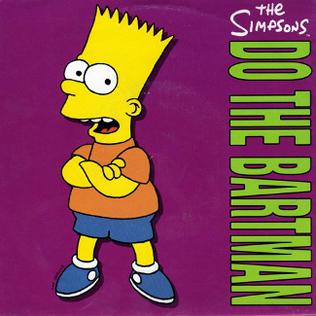 W
W"Do the Bartman" is a song from the 1990 album The Simpsons Sing the Blues, featuring the voice cast of the American television cartoon The Simpsons. It was performed by The Simpsons cast member Nancy Cartwright, with backing vocals from Michael Jackson, alongside additional vocals from Dan Castellaneta. Jackson also produced the song, which was written by American recording artist Bryan Loren, and Geffen Records released it as a single on November 20, 1990.
 W
W"(Do the) Mashed Potatoes" is a rhythm and blues instrumental. It was recorded by James Brown with his band in 1959 and released as a two-part single in 1960. For contractual reasons the recording was credited to "Nat Kendrick and the Swans".
 W
WThe Dougie is a hip-hop dance generally performed by moving one's body in a shimmy style and passing a hand through or near the hair on one's own head.
 W
WThe Floss is a popular dance move in which a person repeatedly swings their arms, with clenched fists, from the back of their body to the front, on each side.
 W
W"Futsal Shuffle 2020", or simply titled "Futsal Shuffle" is a song by American rapper Lil Uzi Vert. It was released through Generation Now and Atlantic Records as the lead single from his second studio album, Eternal Atake on December 13, 2019. The song features three sound clips, including two of his interviews with Nardwuar during Breakout Winter Festival and Rolling Loud Festival in Vancouver, British Columbia and Miami, Florida, respectively, as well as from Tyler, the Creator's performance of "Boredom" at the 2019 Camp Flog Gnaw. The song debuted at number 5 on the Billboard Hot 100, outpeaking "XO Tour Llif3" as Vert's highest charting single on the chart as a solo artist. The song itself has also inspired a dance based on the song with the same title.
 W
W"Gangnam Style" is a song by South Korean singer Psy, released on July 15, 2012, by YG Entertainment as the lead single of his sixth studio album, Psy 6, Part 1. A K-pop and dance-pop song, the term "Gangnam Style" is a Korean neologism that refers to a lifestyle associated with the Gangnam District of Seoul. The song received mixed reviews, with praise for its catchy beat and Psy's amusing dancing in the music video and during live performances in various locations around the world.
 W
W"Harlem Shuffle" is an R&B song written and originally recorded by the duo Bob & Earl in 1963. In 1986 it was covered by The Rolling Stones on their album Dirty Work.
 W
W"Hit the Quan" is the debut single by American rapper iLoveMemphis. This song is based around a dance that was first made popular by American rapper Rich Homie Quan. It peaked at number 15 on the Billboard Hot 100.
 W
WThe Hokey Cokey or Hokey Pokey is a campfire song and participation dance with a distinctive accompanying tune and lyric structure. It is well known in English-speaking countries. It originates in a British folk dance, with variants attested as early as 1826. The song and accompanying dance peaked in popularity as a music hall song and novelty dance in the mid-1940s in the UK. The song became a chart hit twice in the 1980s. The first UK hit was by the Snowmen, which peaked at UK No. 18 in 1981.
 W
W"The Hucklebuck" is a jazz and R&B dance tune first popularized by Paul Williams and His Hucklebuckers in 1949. The composition of the tune was credited to Andy Gibson, and lyrics were later added by Roy Alfred. The song became a crossover hit and a dance craze, in many ways foreshadowing the popular success of rock and roll a few years later. It was successfully recorded by many other musicians including Lucky Millinder, Roy Milton, Tommy Dorsey, Frank Sinatra, Lionel Hampton, Louis Armstrong, Chubby Checker, Bo Diddley, Otis Redding, Canned Heat, Coast to Coast, Brendan Bowyer and Crystal Swing.
 W
W"The Humpty Dance" is a song by the rap group Digital Underground from their debut album Sex Packets. Released as the second single from the album, it reached No. 11 on the pop chart, No. 7 on the R&B chart, and No. 1 on the Billboard Rap Singles chart. The song is sung by Shock G's alter ego, "Humpty Hump", marking the character's second musical appearance; the first was Digital Underground's "Doowutchyalike," a pre-album video-single released in the spring of 1989. The song has been sampled by many different artists and producers. In the song's video, a young Tupac Shakur is visible in the background.
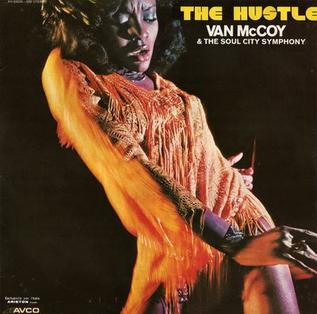 W
W"The Hustle" is a disco song by songwriter/arranger Van McCoy and the Soul City Symphony. It went to No. 1 on the Billboard Hot 100 and Hot Soul Singles charts during the summer of 1975. It also peaked at No. 9 on the Australian Singles Chart and No. 3 in the UK. It would eventually sell over one million copies. The song won the Grammy Award for Best Pop Instrumental Performance early in 1976 for songs recorded in 1975.
 W
WThe Ickey Shuffle was a touchdown celebration performed by National Football League (NFL) fullback Elbert "Ickey" Woods, who played for the Cincinnati Bengals. After scoring a touchdown, Woods would shuffle his feet to the right and hold the football out to the right, shuffle his feet to the left and hold the football out to the left, and finally finish by doing three hops to the right and spiking the football into the ground. Woods performed this polished official version of the dance for the first time during the 1988 Cincinnati Bengal's season, after scoring against the New York Jets on October 10, 1988. The move led to the NFL creating a rule designating it as "Excessive Celebration" and subject to penalty against the player's team. The dance was in danger of being prohibited by NFL rules concerning planned celebrations, but after investigation, was not banned.
 W
W"The Ketchup Song (Aserejé)" is the debut single by Spanish pop group Las Ketchup, taken from their debut studio album Hijas del Tomate (2002). The song tells the story of a rastafari-like gypsy (afrogitano) with a special charm. In addition to the original Spanish version, the song exists in forms with Spanglish and Portuguese verses, although the nonsensical chorus is identical in all three versions.
 W
WLambada is a dance from Pará, Brazil. The dance became internationally popular in the 1980s, especially in the Philippines, Latin America and Caribbean countries. It has adopted aspects of dances such as forró, salsa, merengue, maxixe and the carimbó.
 W
W"Lean Back" is a song by American hip hop group Terror Squad. It was released as the second single from their second studio album, True Story, on June 8, 2004. An uptempo hip hop song built for the club environment, it features Fat Joe with Remy Ma handling the second verse. It topped the US Billboard Hot 100 for three weeks, starting on August 21, 2004, and topped the Billboard Hot R&B/Hip-Hop Singles & Tracks chart for more than a month. The song appeared in the video games Need For Speed Underground 2, Def Jam Rapstar and The Hip Hop Dance Experience.
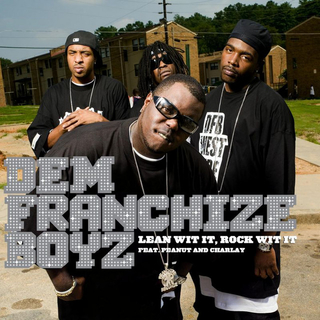 W
W"Lean wit It, Rock wit It" is a song by Atlanta rap group Dem Franchize Boyz from their album On Top of Our Game. The recording features Peanut and Charlay and was produced by Maurice "Parlae" Gleaton.
 W
WLimbo is a popular game, based on traditions that originated on the island of Trinidad. The aim is to pass forwards under a low bar without falling or dislodging the bar.
 W
WThe Lindy Hop is an American dance which was born in the African-American communities in Harlem, New York City, in 1928 and has evolved since then. It was very popular during the swing era of the late 1930s and early 1940s. Lindy was a fusion of many dances that preceded it or were popular during its development but is mainly based on jazz, tap, breakaway, and Charleston. It is frequently described as a jazz dance and is a member of the swing dance family.
 W
W"The Loco-Motion" is a 1962 pop song written by American songwriters Gerry Goffin and Carole King. "The Loco-Motion" was originally written for Dee Dee Sharp, but Sharp turned the song down. The song is notable for appearing in the American Top 3 thrice, each time in a different decade: in 1962 by the American pop singer Little Eva ; in 1974 by the American band Grand Funk Railroad ; and finally in 1988 by the Australian singer Kylie Minogue.
 W
W"Macarena" is a Spanish dance song by Los del Río about a woman of the same name. Appearing on the 1993 album A mí me gusta, it was an international hit and dance craze throughout the second half of the 1990s. The song got the group ranked the "#1 Greatest One-Hit Wonder of All Time" by VH1 in 2002. The song uses a type of clave rhythm. In 2012, it was ranked No. 7 on Billboard's All Time Top 100. It also ranked at No. 1 on Billboard's All Time Latin Songs.
 W
WThe Madison is a novelty dance that was popular in the late 1950s to mid-1960s.
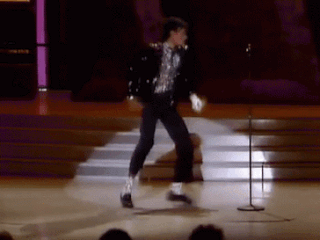 W
WThe moonwalk or backslide is a dance move in which the performer glides backwards but their body actions suggest forward motion. The moonwalk is a popping move. It became popular around the world following Michael Jackson's moonwalk during the performance of "Billie Jean" on Motown 25: Yesterday, Today, Forever, which was broadcast on May 16, 1983, and he included it in tours and live performances. Jackson has been credited as renaming the "backslide" to the moonwalk and it became his signature move.
 W
WThe Nae Nae is a hip-hop dance that involves placing one arm in the air and swaying from side to side. The Atlanta hip hop group We Are Toonz is credited for inventing the phrase with their hit song "Drop That NaeNae" in 2013. The dance was based on a character from the 1990s sitcom Martin. In the series, Martin Lawrence cross-dressed to play Sheneneh Jenkins, an exaggerated, sassy “ghetto girl”. The group member Callamar stated in an interview with Billboard, “It’s really just based on a ratchet girl in the club dancing kind of funny and the best girl to describe it is Sheneneh from Martin.” In one interview, Martin Lawrence stated he was “flattered” by the dance.
 W
W"Neutron Dance" is a song written by Allee Willis and Danny Sembello which was introduced by the Pointer Sisters on their 1983 album Break Out. The song became a Top Ten hit in 1985, its success augmented by being prominently featured on the soundtrack of motion picture Beverly Hills Cop.
 W
WThe Running Man, originally an African dance, is a street and fad dance that originated between late 1986–early 1987 and was performed notably by Janet Jackson in the video of her hit "Rhythm Nation" and subsequently on the Rhythm Nation World Tour and various live performances. An early performance of the dance was in a Fela Kuti concert called "Cross Examination" by one of his back-up dancers/ex-wife in Berlin in 1978. Additionally, it was performed by MC Hammer, Bobby Brown, Milli Vanilli, and Vanilla Ice during their live concert shows and music videos, but achieved renewed popularity in the 2000s. It is also used in some forms of the Melbourne shuffle dance style. It consists of a hopping or sliding step done in such a way at speed to simulate a runner.
 W
W"The Safety Dance" is a song by Canadian new wave/synth-pop band Men Without Hats, released in Canada in 1982 as the second single from Rhythm of Youth. The song was written by lead singer Ivan Doroschuk after he had been kicked out of a club for pogo dancing.
 W
W"Saturday Night" is a song by Italian Eurodance project Whigfield which was performed by Danish-born Sannie Charlotte Carlson. It was first released in 1992 in Italy and November 1993 in Spain through Prodisc. In 1994, it was released in the rest of Europe and experienced worldwide success. The song is written by Italian producers Larry Pignagnoli and Davide Riva, and produced by Pignagnoli. In 1994, the song was included on her debut album, Whigfield.
 W
WA shimmy is a dance move in which the body is held still, except for the shoulders, which are quickly alternated back and forth. When the right shoulder goes back, the left one comes forward. It may help to hold the arms out slightly bent at the elbow, and when the shoulders are moved, keep the hands in the same position.
 W
W"Shoulder Lean" is a song by American hip hop recording artist Young Dro, released July 4, 2006 as his debut single and the lead single from his debut studio album Best Thang Smokin'. The song features Dro's fellow American rapper and Grand Hustle label-boss T.I. on the hook. The production was handled by Grand Hustle in-house producer Cordale "Lil' C" Quinn. The song was a massive hit in the United States, reaching the Top 10 on the Billboard Hot 100 and at number one on the Hot R&B/Hip Hop Songs chart. This was Young Dro's first and only Top 10 single and T.I.'s fourth Top 10 single.
 W
W"Teach Me How to Dougie" is a song recorded by American hip hop group Cali Swag District. It was produced by Runway Star for Cali Swag District's debut studio album, The Kickback (2011). The song was written by Chanti Glee, Charon Childs, and Corey Fowler, and was released digitally on April 12, 2010 as the first single from the album through Capitol Records. The title refers to the Dougie dance, which originated in Dallas, Texas by rapper, Lil' Wil from his song "My Dougie".This is Adeliyi's first song release as a rapper.
 W
W"Time Warp" is a song featured in the 1973 rock musical The Rocky Horror Show, its 1975 film adaptation The Rocky Horror Picture Show, and a 2016 TV production. The name is also used for the dance performed during the chorus of the song. The song is both an example and a parody of the dance song genre, with much of the lyrics consisting of dance step instructions. This dance is one of the major audience-participation activities during screenings of the film and performances of the show. It has become a popular song beyond the reaches of the film and show, and is often played at dances and weddings.
 W
WThe turkey trot was a dance made popular in the early 1900s. The Turkey Trot was done to fast ragtime music popular in the decade from 1900 to 1910 such as Scott Joplin's Maple Leaf Rag. Driven largely by youth counterculture of the time, the turkey trot fad quickly fell out of favor as the foxtrot, a much more conservative dance step based on the waltz, rose to popularity in 1914.
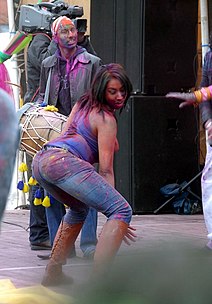 W
WTwerking is a type of dance that came out of the bounce music scene of New Orleans in the late 1980s. Individually-performed, chiefly but not exclusively by women, dancers move by throwing or thrusting their hips back or shaking their buttocks, often in a low squatting stance. Twerking is part of a larger set of characteristic moves unique to the New Orleans style of hip-hop known as "bounce". Moves include "mixing", "exercising", the "bend over", the "shoulder hustle", "clapping", "booty clapping", "booty poppin", and "the wild wood"—all recognized as "booty shaking" or "bounce". Twerking is but one choreographic gesture within bounce.
 W
WThe twist is a dance that was inspired by rock and roll music. From 1959 to the early sixties it became a worldwide dance craze, enjoying immense popularity while drawing controversies from critics who felt it was too provocative. It inspired dances such as the Jerk, the Pony, the Watusi, the Mashed Potato, the Monkey, and the Funky Chicken, but none were as popular.
 W
WVogue, or voguing, is a highly stylized, modern house dance originating in the late 1980s that evolved out of the Harlem ballroom scene of the 1960s. It gained mainstream exposure when it was featured in Madonna's song and video "Vogue" (1990), and when showcased in the 1990 documentary Paris Is Burning. In its modern form, this dance has become a global phenomenon that continues to evolve both stylistically and demographically.
 W
W"Walkin' the Dog" is a song written by Shelton Brooks in 1916. Written for the Dancing Follies of 1916, its chorus is:
 W
WThe Watusi is a solo dance that enjoyed brief popularity during the early 1960s. It was one of the most popular dance crazes of the 1960s in the United States. "Watusi" is a former name for the Tutsi people of Africa, whose traditions include spectacular dances. The naming of the American dance may have been inspired, in particular, by a scene in the 1950 film King Solomon's Mines which featured Tutsi dancers, or by its sequel Watusi.
 W
W"Willie and the Hand Jive" is a song written by Johnny Otis and originally released as a single in 1958 by Johnny Otis, reaching #9 on the Billboard Hot 100 chart and #5 on the Billboard R&B chart. The song has a Bo Diddley beat and was partly inspired by the music sung by a chain gang Otis heard while he was touring. The lyrics are about a man who became famous for doing a dance with his hands, but the song has been accused of glorifying masturbation, though Otis has always denied it. It has since been covered by numerous artists, including The Strangeloves, Eric Clapton, Cliff Richard, Kim Carnes, George Thorogood and The Grateful Dead. Clapton's 1974 version was also released as a single and also reached the Billboard Top 40, peaking at #26. Thorogood's 1985 version reached #25 on the Hot Mainstream Rock Tracks chart.
 W
W"Y.M.C.A." is a song by the American disco group Village People. It was released in 1978 as the only single from their third studio album, Cruisin' (1978). The song was written by Jacques Morali and singer Victor Willis. A medley with "Hot Cop" reached No. 2 on Billboard's Dance Music/Club Play Singles chart, while the song reached No. 2 on the Billboard Hot 100 charts in early 1979, placing behind both "Le Freak" by Chic and "Da Ya Think I'm Sexy?" by Rod Stewart. Outside the US, "Y.M.C.A." reached No. 1 in the UK around the same time, becoming the group's biggest hit. It is one of fewer than 40 singles to have sold 10 million physical copies worldwide.